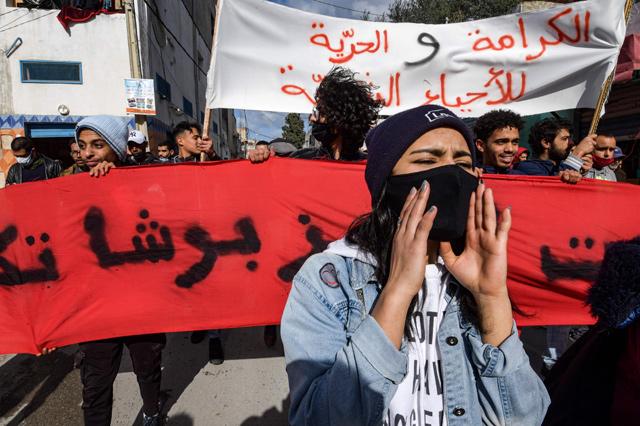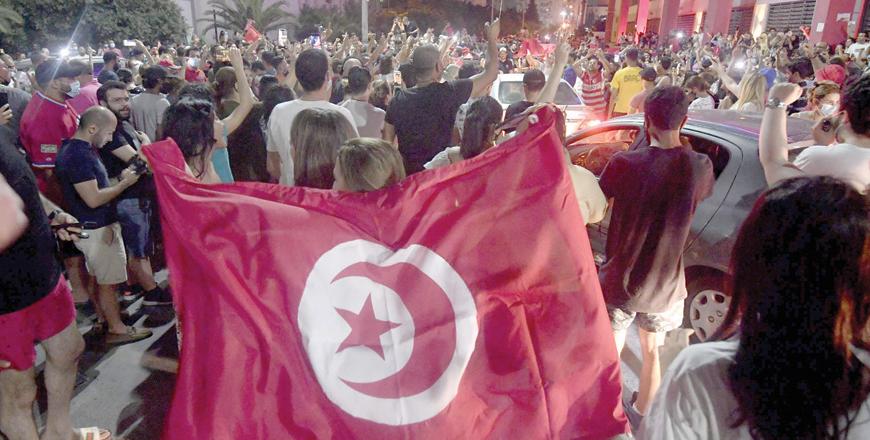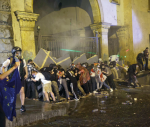You are here
Tunisian protesters march on parliament amid cabinet reshuffle
By AFP - Jan 26,2021 - Last updated at Jan 26,2021

Tunisian protesters try to access the parliament building on Tuesday in Tunis (AFP photo)
TUNIS — Hundreds of Tunisian anti-government protesters demonstrated on Tuesday near the parliament, which was guarded by riot police as lawmakers inside held a heated debate on a cabinet reshuffle.
Prime Minister Hichem Mechichi told the assembly that by naming 11 new ministers to the interior, justice, health and other key portfolios, he aimed to create a "more effective" reform team.
He faced opposition from President Kais Saied, however, who said he was not consulted, charged that one of the proposed ministers was "involved in a corruption case" and that three others were suspected of conflicts of interest.
Tunisia, mired in a political and economic crisis worsened by the COVID-19 pandemic, has been rocked by a wave of social unrest a decade after the Arab Spring protests overthrew autocrat Zine Al Abidine Ben Ali.
Security forces have carried out mass arrests during more than a week of night-time riots and daytime protests against police repression, poverty, inequality and corruption.
Tunisia has often been praised as a rare success story for its democratic transition after the Arab Spring regional uprisings sparked by its 2011 revolution.
But many Tunisians are angered at a political class seen as obsessed with power struggles and disconnected from the suffering of the poor, amid high unemployment and spiralling prices.
"Poverty is growing, hunger is growing," read one sign carried by the protesters, while another demanded "Dignity and freedom for working-class neighbourhoods".
'Threat of the baton'
The session came a day after protesters clashed with police in the town of Sbeitla, in Tunisia's marginalised centre, after a young man hit by a tear gas canister last week died in hospital.
Hundreds of protesters on Tuesday gathered near the parliament, heeding a call from almost 30 civil society groups to demonstrate there against police repression.
Some chanted slogans against the government and Ennahdha, the biggest party in parliament.
A group of protesters walked from the capital's outer district of Ettadhamen.
But police forces stopped demonstrators from gathering at the usual square in front of the parliament.
"The politicians are producing the same strategies that until now have only led to failure," said Yosra Frawes, head of the Tunisian Association of Democratic Women.
"They must change their governance model or step down."
Some lawmakers criticised the heavy security deployment around the assembly and called for further dialogue.
One complained of a vote held "under police siege" and said: "All that's missing is to vote under the threat of the baton".
Some members of the opposition held up pictures of the young man who was killed.
An AFP correspondent said there were clashes between police and demonstrators on Tuesday on the sidelines of his funeral.
Protests have been held in defiance of a ban on gatherings and a night-time curfew recently extended until February 14.
The novel coronavirus has killed more than 6,000 people in the north African country and wreaked havoc on an already struggling economy.
Fragile alliances
Tunisia's politics have also been turbulent and seen a deepening rift between the prime minister and head of state.
President Saied — an independent academic who has criticised parliamentary democracy — has been seeking to reposition himself at the centre of an unstable political scene.
The task of forming a government has become more difficult since elections in October 2019 resulted in a parliament split among myriad parties and fragile alliances.
Islamist-inspired Ennahdha came top in the polls but fell far short of a majority and eventually agreed to join a coalition government.
Mechichi's outgoing cabinet was sworn in September after the previous executive, the second since the polls, resigned in July.
Mechichi had initially put together a team including civil servants and academics, some close to the president.
But he gradually moved away from Saied, and made changes with the support of Ennahdha, which is allied with the liberal Qalb Tounes party and Islamist group Karama.
Saied has threatened to block the swearing in of some new ministers, a move that could aggravate animosities that have paralysed political action.
Related Articles
TUNIS — Hundreds of anti-government protesters faced off against riot police outside the Tunisian parliament Tuesday as lawmakers inside con
TUNIS — Tunisian President Kais Saied sacked the defence minister on Monday, a day after ousting the prime minister and suspending parliamen
TUNIS — Three leaders of Tunisia's once-dominant Ennahdha Party are on a hunger strike to protest their detention under a crackdown against

















